Overview
The title "10 Essential Couples Therapy Questions for Relationship Growth" poses an important question: How can we identify key inquiries that facilitate growth in our relationships through therapy? This article highlights that these questions are not just inquiries; they are vital tools for fostering open communication, setting clear goals, and addressing underlying issues. By engaging with these questions, couples can enhance their emotional connection and build resilience as they navigate their therapeutic journey together. Have you ever felt that your relationship could benefit from deeper understanding and connection? These essential questions might just be the starting point you need.
Introduction
In a world where relationships often face unprecedented challenges, The Emerald Couch stands as a beacon of hope for couples seeking transformation. Have you ever felt overwhelmed by your past? With a compassionate and holistic approach, this innovative therapy center tailors its methods to address the unique dynamics of each partnership. By delving into underlying traumas and fostering a safe space for open dialogue, therapists empower couples to navigate their emotional landscapes and strengthen their bonds.
Through evidence-based practices and mindfulness techniques, The Emerald Couch not only promotes healing but also encourages personal growth. Imagine reconnecting with your partner on a deeper level. As you embark on this journey, you will be equipped with the tools to articulate your goals, resolve conflicts, and enhance intimacy, paving the way for a more fulfilling and resilient relationship. Together, let’s explore the possibilities of healing and connection.
The Emerald Couch: Tailored Couples Therapy for Relationship Transformation
offers a to , thoughtfully tailored to meet the unique needs of each partnership. Have you ever felt overwhelmed by your past? By focusing on underlying and anxiety, therapists facilitate discussions using to create a safe space where couples can gently explore their dynamics. This personalized methodology not only facilitates healing but also fosters personal growth by addressing couples therapy questions, allowing partners to reconnect and strengthen their bond through . Mindfulness plays a transformative role in this process, enhancing —key elements for navigating the complexities of trauma in relationships. The Emerald Couch provides a variety of treatment options, including:
- Dialectical behavioral therapy (DBT)
- Acceptance and commitment therapy (ACT)
- Cognitive behavioral therapy (CBT)
This ensures that each partnership receives the most suitable approach for their specific situation, promoting a deeper connection.
To enhance compatibility and ensure a good fit, The Emerald Couch offers , increasing the likelihood of successful outcomes. Additionally, therapists provide superbills for insurance reimbursement, making mental health services more financially accessible for everyone. By combining with a profound understanding of trauma's effects, The Emerald Couch emerges as an essential resource for partners seeking that lead to lasting change.
As Anna K. Schaffner notes, the is vital, and The Emerald Couch embodies this philosophy in its therapeutic practices. Take the first step towards healing today—your journey towards connection and understanding awaits.
What Are Your Goals for Couples Therapy?
Articulating for relationship therapy is essential for partners to express their aspirations, whether it involves enhancing communication, rebuilding trust, or deepening intimacy. This clarity not only enables therapists to customize their strategies but also empowers partners to actively engage in their .
At The Emerald Couch, we begin with an intake session where we gather essential information to collaboratively create a tailored to each partnership's unique needs. Considering that individuals in relationships typically stay in therapy for around six months, becomes vital during this time to ensure that progress is made and that both individuals feel they are moving towards their desired outcomes. Goals should encompass specific, measurable outcomes that both partners agree upon, fostering a . Periodic check-ins on progress towards these goals are integral to the treatment process, allowing for adjustments and reaffirmation of commitment.
The importance of goal clarity cannot be overstated; it serves as a roadmap for the . A case study titled "Understanding the Consequences of Ignored Emotional Needs" reveals that when , it can lead to resentment and disconnection. This underscores the significance of addressing these needs through clear goals, as establishing defined objectives enables partners to avoid self-betrayal in connections that do not fulfill their emotional requirements.
Experts emphasize that successful partners maintain a , which is crucial for long-term relationship satisfaction. Effective goal-setting in counseling can be achieved through that facilitate open discussions about each partner's needs and aspirations, ensuring that both individuals feel heard and valued. As Sanaa Hyder observes, successful partners strive to view each other positively, highlighting the importance of sustaining this outlook throughout the therapeutic process. This collaborative approach, supported by individualized progress assessments at The Emerald Couch, not only enhances commitment but also enriches the overall healing experience, leading to successful outcomes in .
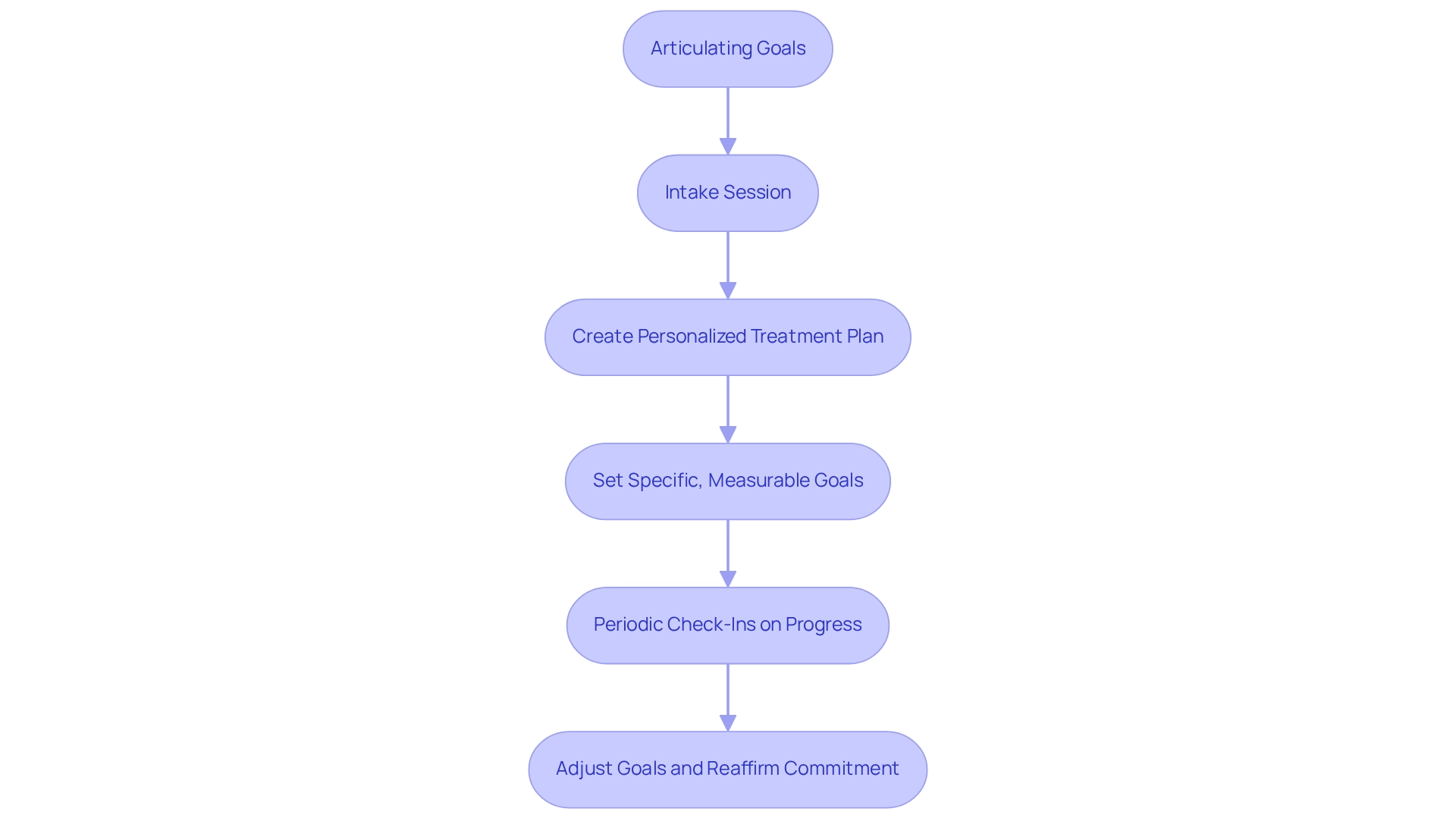
How Do You Handle and Resolve Conflicts Currently?
encourage couples to take a moment to reflect on their current . Do you find yourselves leaning towards avoidance, confrontation, or perhaps discussing couples therapy questions related to compromise? Recognizing these patterns can unveil deeper issues that may be addressed through couples therapy questions. , such as active listening and the use of 'I' statements, can significantly enhance how partners navigate disagreements. can further enrich these strategies by helping individuals slow down and recognize their thoughts and feelings in the moment. This allows for more thoughtful responses rather than automatic reactions.
Consider this: while only 10% of conflicts arise from differing opinions, a staggering 90% stem from miscommunication, often worsened by tone of voice. This underscores the vital role of in resolving disputes. As Dr. Kathy McMahon, a licensed psychologist, poignantly states, "But what really matters? Making available and applicable for partners eager to grow stronger together." Therapists can support partners in adopting these strategies by using couples therapy questions, fostering an environment where both individuals feel heard and understood.
For instance, a case study from The Emerald Couch illustrates how assist partners in developing tailored methods for conflict resolution. This not only enhances their but also builds resilience. By integrating mindfulness into their interactions, partners can and deeper understanding. Mindfulness not only aids in emotional regulation but also improves stress management, enabling partners to approach conflicts with a clearer mindset.
Practicing mindfulness during therapy sessions can help partners learn to apply these techniques in their daily lives, ultimately leading to healthier communication and stronger relationships. Have you ever felt overwhelmed by your past? Embracing these strategies can be a meaningful step towards healing and connection.
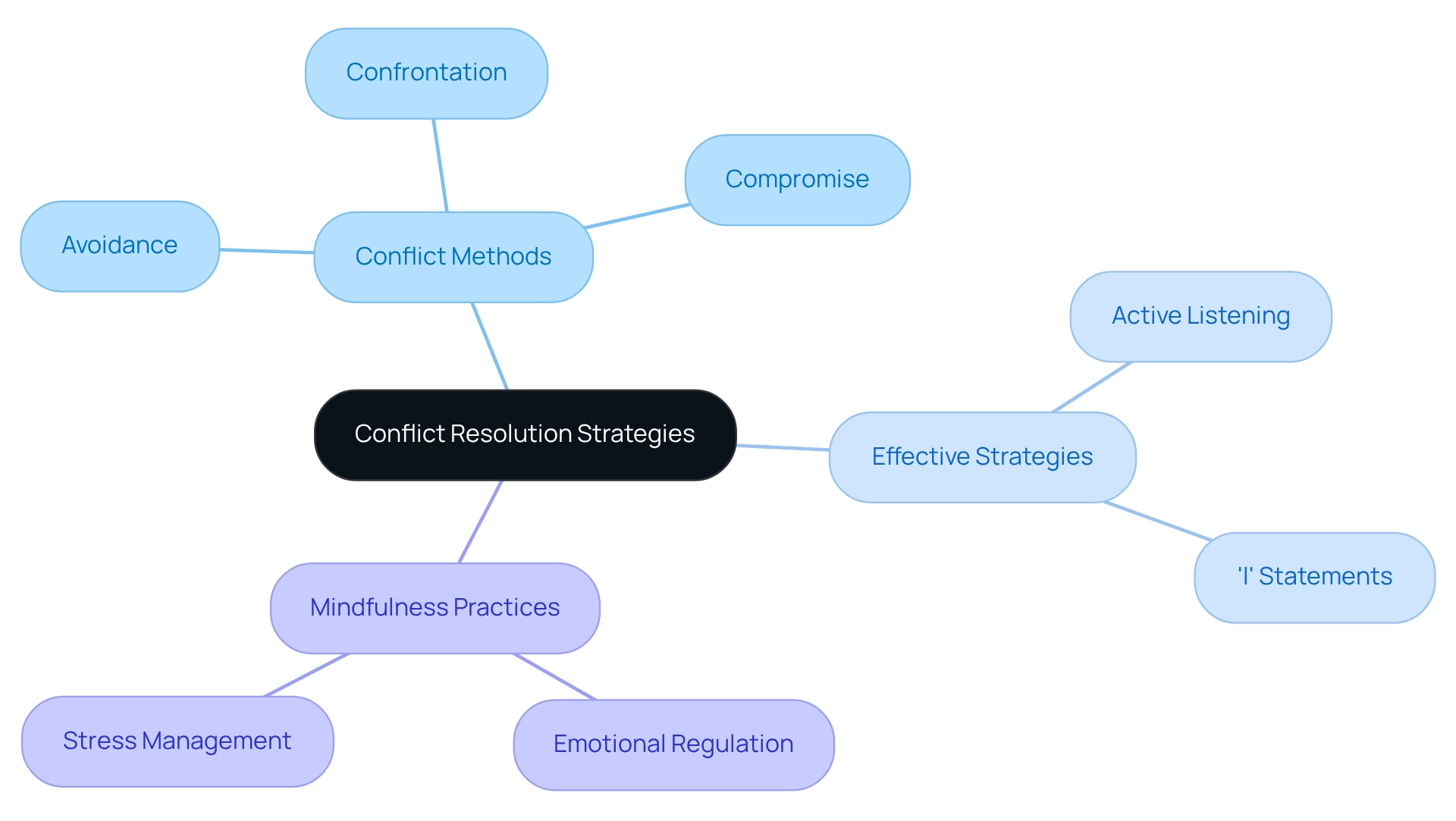
What Is Your Level of Satisfaction with Your Sex Life and Intimacy?
should prompt partners to engage in with both their sex life and intimacy, as these elements are deeply interconnected with emotional connection. Have you ever felt overwhelmed by your past? Therapists employ evidence-based methods to facilitate these discussions, guiding individuals to explore their desires, establish boundaries, and identify obstacles to intimacy, such as anxiety or past trauma. For overachievers, the pressure to perform can exacerbate feelings of overwhelm and anxiety, which may hinder open communication. Research suggests that not only strengthens emotional ties but also increases physical intimacy, assisting partners in revitalizing their connection.
As we explore this further, Dr. John Gottman recommends that individuals allocate 15-20 minutes daily to discuss the stresses and challenges encountered outside of their connection. During these moments, the listener provides empathy and support without attempting to resolve the issue. By addressing , partners can gain a deeper understanding of one another, leading to enhanced sexual satisfaction and a stronger bond. on to express their feelings and needs, ultimately fostering resilience and growth in their relationship.
Furthermore, it's essential to acknowledge that , making it vital for partners to talk about these emotions candidly. For those considering therapy, has been found to be as effective as in-person sessions, providing accessible options for support. To initiate these important discussions, couples may find it helpful to while choosing a specific time and comfortable setting, ensuring they can communicate openly and honestly.
What Is Your Individual History with Anxiety, Depression, or Trauma?
Every collaborator is encouraged to share their personal experiences with anxiety, depression, or trauma openly. These factors profoundly . By discussing that address each other's mental health histories, we foster empathy and support, which are essential for nurturing a healthy partnership. At The Emerald Couch, we recognize that individual trauma can lead to dissociation, complicating emotional connections within relationships. Our , including EMDR and Cognitive Processing Therapy (CPT), are thoughtfully designed to address these challenges, ensuring that both individuals feel heard and supported. We also provide adaptable to meet various needs.
Have you ever felt overwhelmed by your past? Research indicates that approximately 40% of couples therapy questions are related to issues stemming from one partner's mental health struggles. This highlights the prevalence of anxiety and depression in these contexts. Therapists at The Emerald Couch utilize this understanding to develop and couples therapy questions that address these challenges within the connection framework. Effective therapeutic methods frequently involve establishing boundaries, which is vital for and preparing for healthier future interactions, often explored through couples therapy questions. As Elle Markman, PsyD, observes, "Boundary setting is a crucial aspect of recovery from trauma in connections and getting ready for future healthy interactions."
By prioritizing , partners can cultivate resilience and work towards a more supportive and fulfilling connection. Our free 30-minute consultation allows couples to explore their needs and understand how tailored therapy can facilitate . Case studies emphasize the in trauma recovery, demonstrating how therapists and support groups play a crucial role in guiding individuals through their , ultimately enhancing the overall dynamic.
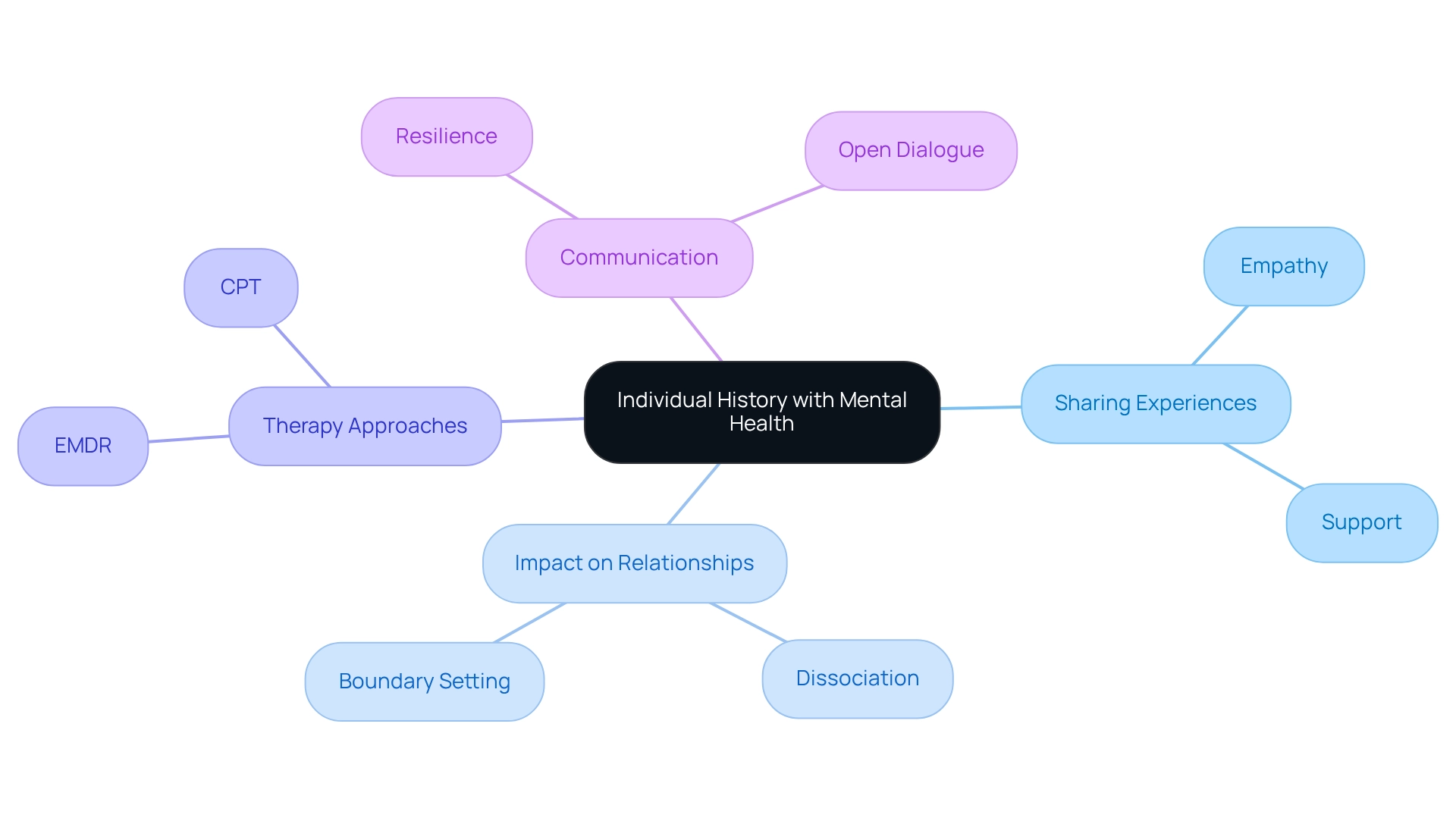
How Would You Rate the Trust in the Relationship?
encourage partners to conduct a thorough evaluation of trust within their partnership, focusing on essential factors such as honesty, reliability, and emotional safety. This evaluation not only uncovers areas where trust may be wavering but also opens the door to , including couples therapy questions about how to rebuild it.
At , we understand the stigma that often surrounds counseling, which can lead to concealing issues out of shame or fear. Our commitment to providing non-judgmental support fosters , allowing partners to express their concerns openly and embark on the fulfilling life they deserve.
Research shows that , such as Emotionally Focused Therapy (EFT), yield positive outcomes in about 70-73% of cases, highlighting the critical importance of addressing couples therapy questions, particularly those related to .
To nurture trust, therapists at The Emerald Couch can introduce targeted exercises, including:
These exercises promote . For example, partners might engage in regular check-ins to share their feelings and experiences, which can significantly enhance trust over time. Another impactful exercise is the 'Trust Fall,' where partners take turns sharing personal fears or insecurities, creating a space for vulnerability and deeper understanding in a safe environment.
Moreover, expert insights stress the importance of consistent empathy and communication in restoring trust. Regularly practicing these principles can lay a foundation of respect, minimizing the risk of taking each other for granted. By actively engaging with couples therapy questions and participating in , couples can foster a more resilient bond, ultimately leading to greater satisfaction and emotional well-being.
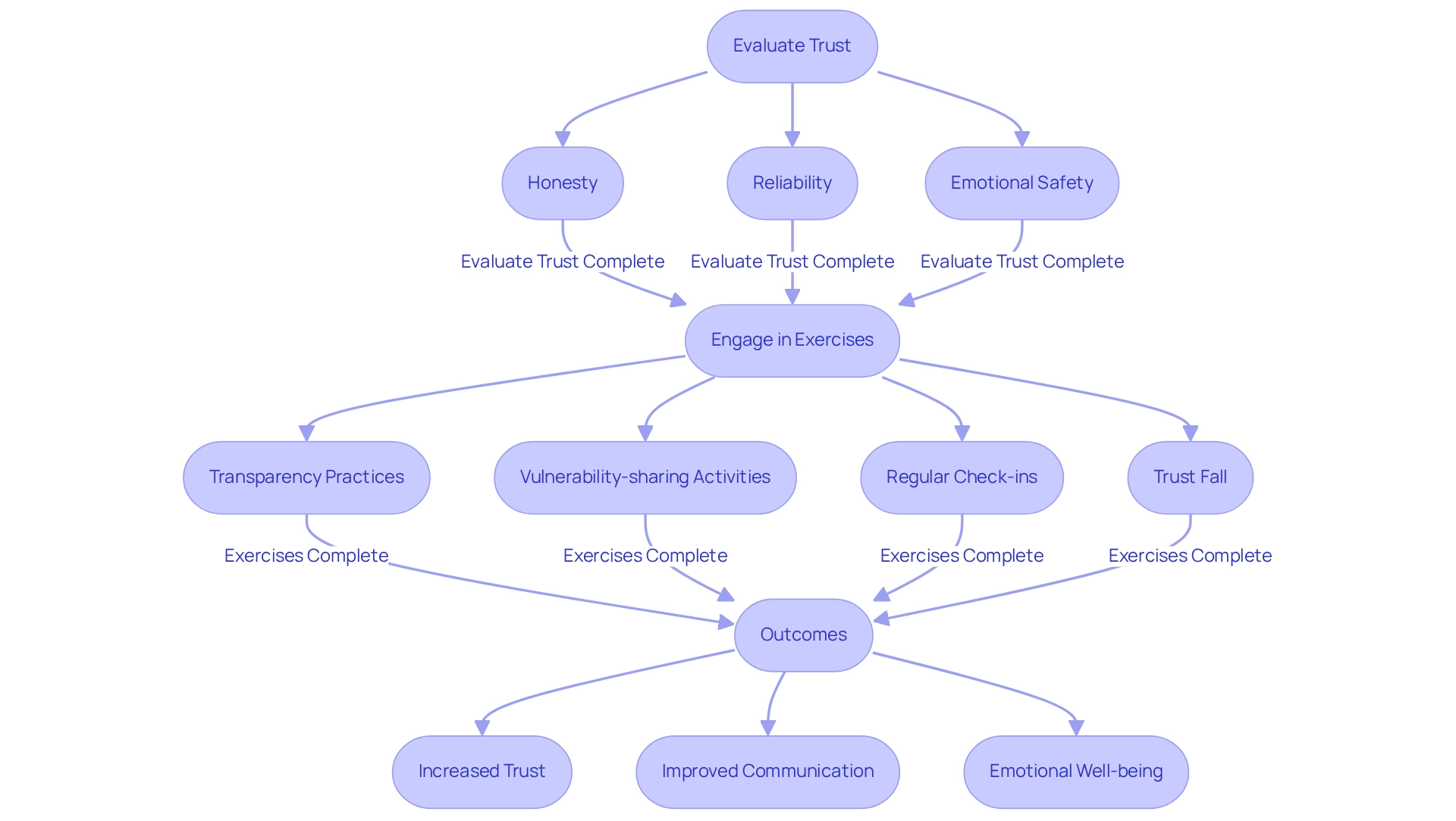
What Past Experiences Have Had an Impact on Your Relationship?
Couples are encouraged to gently explore their through , as these can significantly impact their current dynamics. This exploration often reveals behavioral patterns and unresolved issues rooted in previous relationships or personal histories. For instance, research identifies —secure, anxious-preoccupied, dismissive-avoidant, and fearful-avoidant—that can influence how individuals engage with their significant others. Have you ever felt overwhelmed by your past? Grasping these styles can clarify why specific conflicts occur and how they can be resolved.
At The Emerald Couch, therapists play an these important discussions, guiding partners toward healing and deeper insight. By creating a safe space for dialogue, therapists guide partners through couples therapy questions that help them recognize the impact of their histories on their present interactions. This process not only fosters awareness but also empowers couples to break free from negative cycles and build healthier connections. Effective therapeutic approaches, like , which is a research-supported treatment for PTSD, can be especially beneficial in dealing with these connection histories. CPT involves a structured approach that helps individuals process trauma and change unhelpful thoughts, ultimately reducing the negative effects of past experiences on current connections.
As Dr. Jennifer Glass notes, one of the is the concentration of conservative or evangelical Protestants in that county, highlighting how external factors can also impact dynamics. Furthermore, can lead to an abundance of love in one's life, reinforcing the importance of fostering love within relationships.
Case studies, such as the CDC's initiatives on Adverse Childhood Experiences (ACEs), highlight the . The CDC's dedication to preventing ACEs through community support demonstrates how investing in emotional well-being can result in healthier connections. By understanding the roots of their challenges through couples therapy questions, partners can work together to cultivate resilience and growth. Ultimately, reflecting on past experiences is essential for relationship development. As partners uncover these patterns, they can engage in that address their unique histories, paving the way for a more fulfilling partnership.
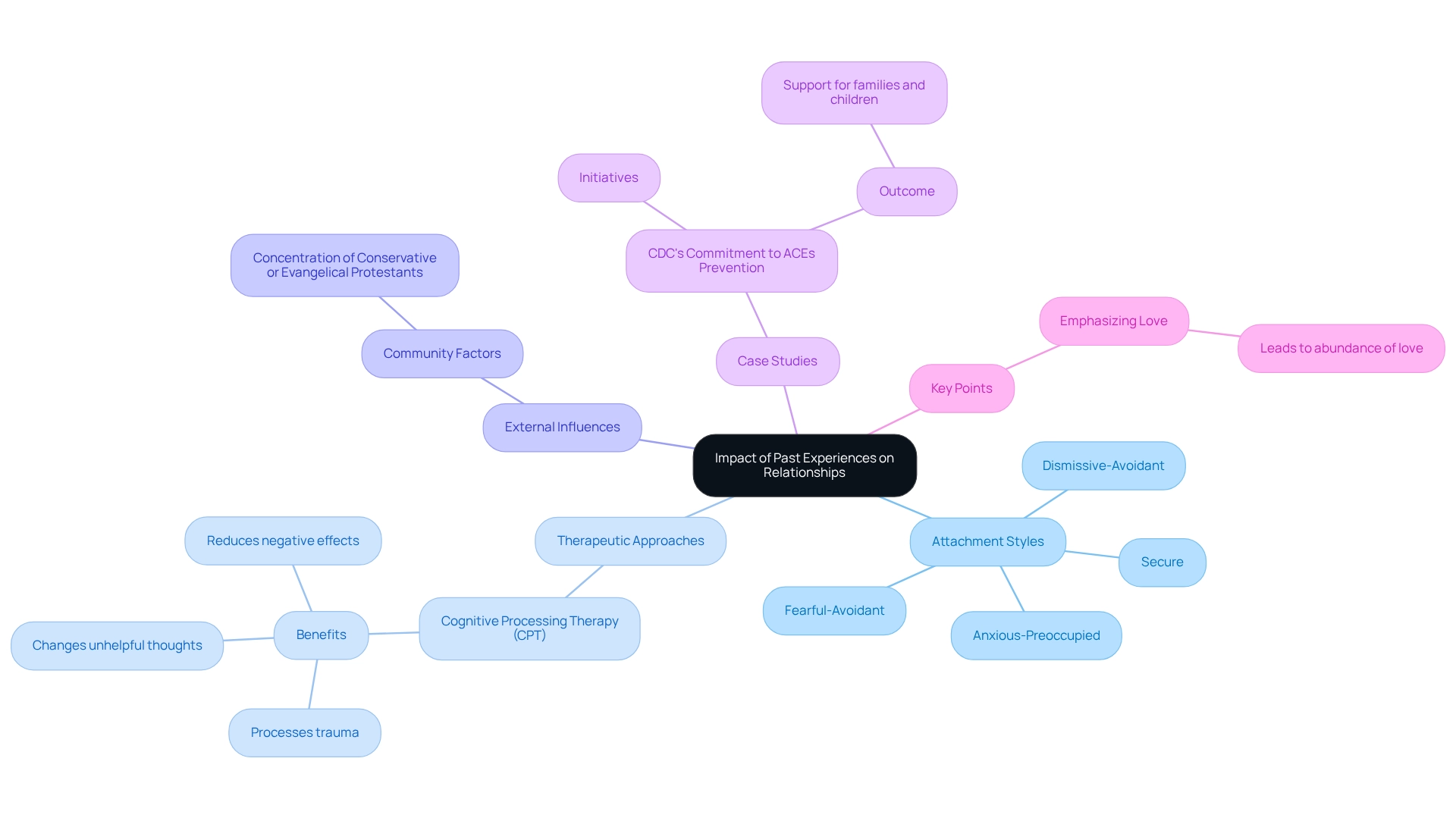
How Do You Want to Be Shown Love?
Couples are encouraged to engage in , exploring their individual —whether that be words of affirmation, acts of service, quality time, gifts, or physical touch. Recognizing and understanding each other's preferences can significantly strengthen emotional bonds, ensuring that expressions of love resonate deeply and fulfill each partner's needs.
Have you ever felt ? Studies show that couples who actively talk about their love languages often experience greater satisfaction in their partnerships. Gandhi advised clients to evaluate whether they are performing well across all five love languages.
In addition to focusing on love languages, it is crucial to recognize , , or trauma that may be addressed through , as these elements can affect bonds.
Case studies reveal that addressing love languages in therapy sessions leads to , such as those highlighted in the '' case study. This study demonstrates how The Emerald Couch empowers clients to . By prioritizing these couples therapy questions, couples can that fosters growth and resilience in their bond.
As we explore this further, consider the impact of these discussions on your relationship. Engaging in this dialogue not only fosters understanding but also paves the way for healing and deeper connections. Let’s take that step together towards a more fulfilling partnership.
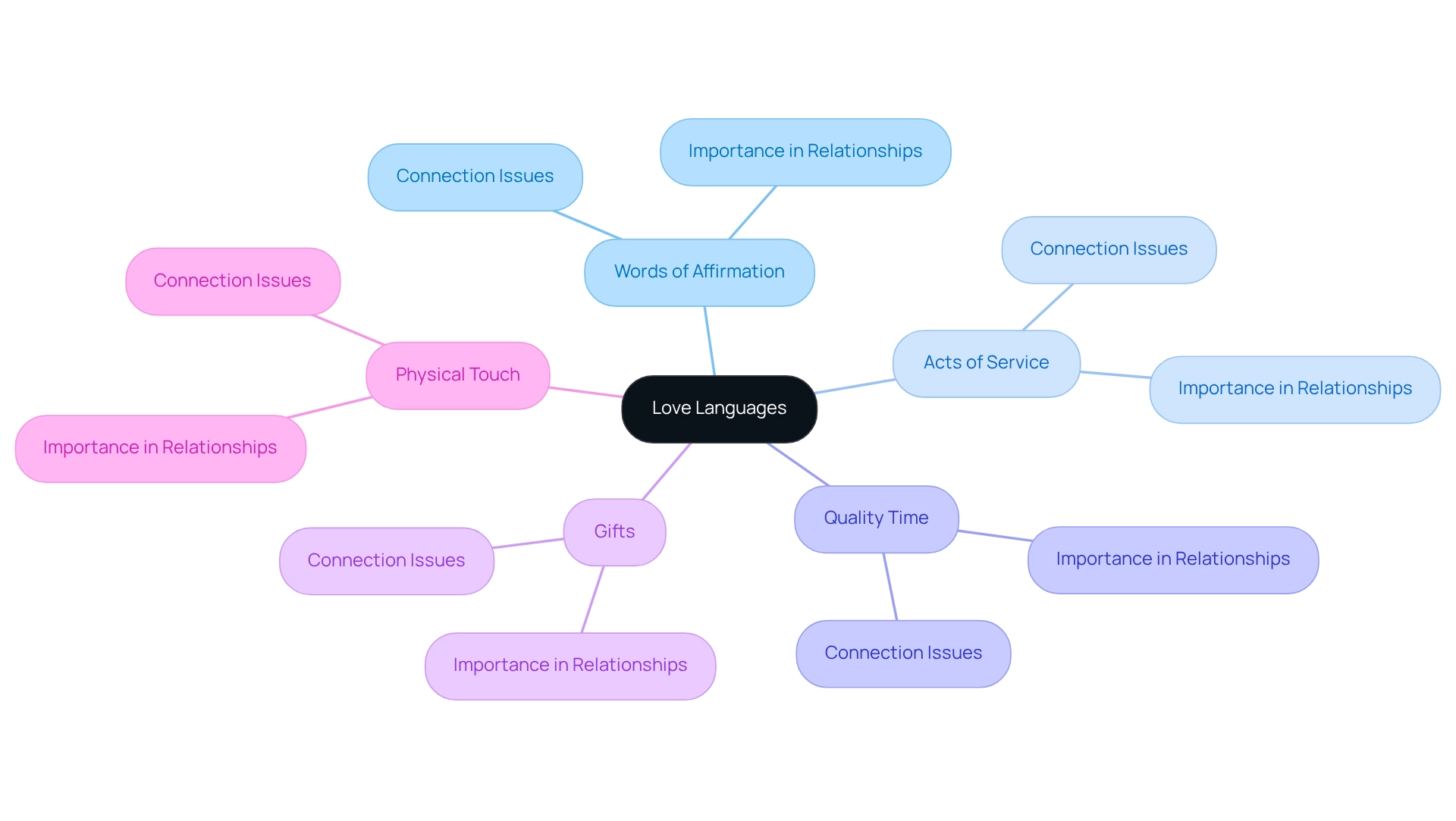
How Do You Handle Stress Both Individually and as a Couple?
encourage partners to discuss their individual and shared approaches to , including coping mechanisms and support systems. For overachievers, who often find it challenging to prioritize their own needs over work or family, recognizing each partner's stress responses can foster empathy and collaboration in addressing stressors.
- Have you ever felt overwhelmed by external pressures?
- For instance, has been linked to higher stress scores, highlighting how these external factors can impact relationships (B = 0.27).
Therapists at often recommend methods such as , which have shown to improve resilience and , helping partners more effectively. A case study titled "The Importance of Mindfulness in Stress Reduction" illustrates that implementing mindfulness techniques can significantly enhance emotional regulation, leading to better mental health outcomes for partners.
In addition to this, can greatly improve how partners manage stress together, reinforcing their connection. As Elbert Hubbard wisely noted, 'The greatest error you can commit in life is to be constantly afraid of making one,' which serves as a reminder for couples to explore couples therapy questions that help them confront fears and stress within their partnership.
With positive social interactions linked to lower risks of depression and anxiety, prioritizing stress management within relationships is crucial for overall mental well-being, especially for trauma survivors. Considering , it is clear that nurturing connections play a significant role in mental health.
Let’s take the step together towards healing and connection.
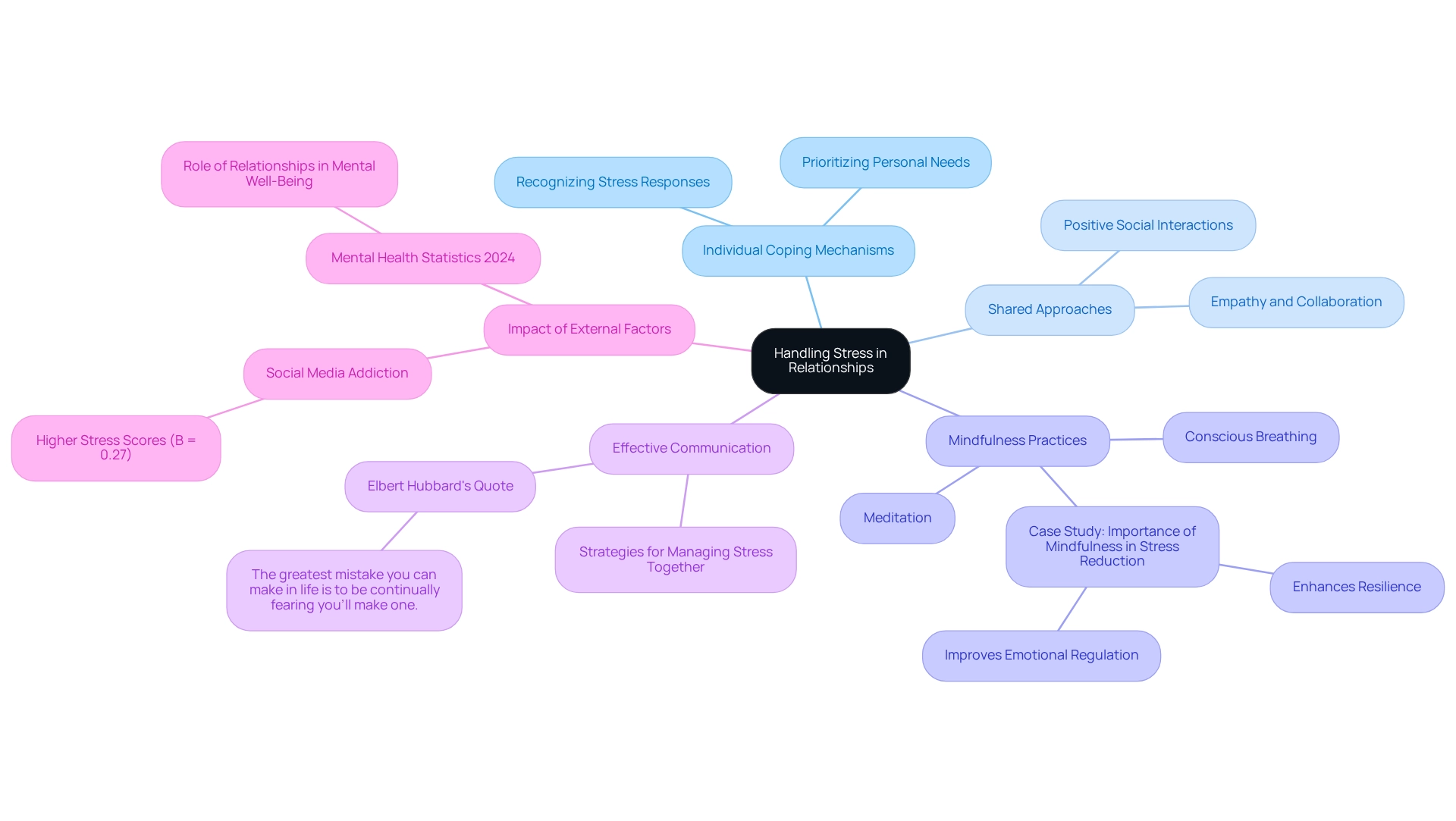
What Are Your Goals for the Future of the Relationship?
encourage partners to engage in , including aspirations such as family planning, career ambitions, and lifestyle choices. This dialogue not only clarifies each partner's vision but also fortifies their commitment to collaborating on shared objectives.
Have you ever felt uncertain about your and thought about discussing couples therapy questions? Research indicates that among likely to set goals in 2023, addressing couples therapy questions to establish mutual aspirations can significantly enhance relationship satisfaction. This is especially true for trauma survivors who may find comfort in a .
Therapists play a crucial role in this process, guiding partners to create . By integrating mindfulness techniques, such as breath awareness and body scans, into these discussions, couples can enhance their and personal growth. This practice allows partners to remain present and engaged, fostering deeper connections and understanding.
As recommended by Dr. Burrets, trauma survivors can reinforce the advantages of counseling by applying insights and skills acquired in sessions to daily life. This results in enhanced interaction dynamics. After each session, discussing small, actionable couples therapy questions can enhance the effectiveness of therapy and strengthen partnerships.
As Stan Tatkin aptly states, "Your personal growth relies on your connection staying safe and secure at all times." This underscores the necessity of in fostering a secure and fulfilling relationship, especially for those navigating the complexities of trauma.
Furthermore, as Sun Tzu advises, while they are manageable is essential. This allows couples to seize small opportunities for larger goals and prepare for challenges together.
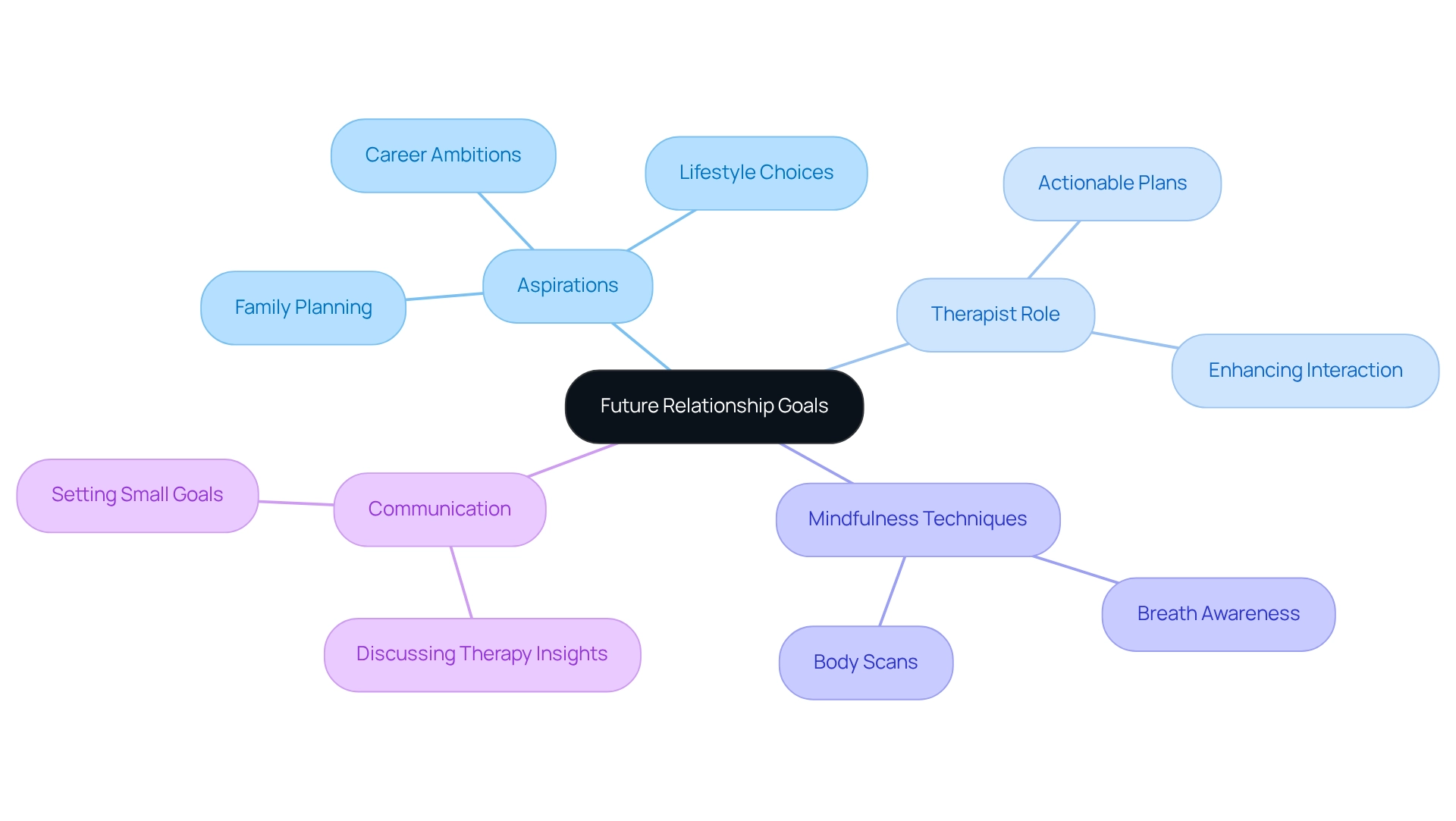
Conclusion
The journey of healing and connection at The Emerald Couch highlights the significance of personalized therapy for couples navigating relationship challenges. By addressing underlying traumas, enhancing communication, and creating a safe space for dialogue, this innovative therapy center empowers partners to explore their emotional landscapes and fortify their bonds. With diverse therapeutic approaches, including mindfulness techniques and evidence-based practices, each couple receives the support they need to flourish together.
The central message emphasizes that successful couples therapy transcends mere conflict resolution; it involves setting clear goals, understanding individual histories, and nurturing a supportive environment. Have you ever felt overwhelmed by your past? Engaging in open discussions about love languages, stress management, and future aspirations allows couples to deepen their emotional connection and build a resilient partnership. Ultimately, The Emerald Couch serves as a vital resource for those seeking transformative interventions, paving the way for more fulfilling and enduring relationships.
As couples embark on this path of self-improvement and discovery, the insights gained through therapy can profoundly influence not only their relationship but also their individual well-being. The commitment to fostering a deeper understanding of each other’s needs and experiences is essential for achieving lasting change. Embracing this journey together can lead to a more harmonious and enriching partnership, where love and trust thrive amidst life’s challenges.
Frequently Asked Questions
What approach does The Emerald Couch take towards relationship therapy?
The Emerald Couch offers a compassionate and holistic approach to relationship therapy, tailored to meet the unique needs of each partnership by focusing on underlying trauma and anxiety.
How do therapists facilitate discussions in couples therapy at The Emerald Couch?
Therapists use couples therapy questions to create a safe space for couples to explore their dynamics, facilitating healing and personal growth.
What role does mindfulness play in the therapy process at The Emerald Couch?
Mindfulness enhances emotional regulation and self-awareness, which are essential for navigating the complexities of trauma in relationships.
What types of treatment options are available at The Emerald Couch?
The Emerald Couch provides various treatment options, including Dialectical Behavioral Therapy (DBT), Acceptance and Commitment Therapy (ACT), and Cognitive Behavioral Therapy (CBT).
How does The Emerald Couch ensure compatibility between partners and therapists?
The Emerald Couch offers free consultations for partners to enhance compatibility and increase the likelihood of successful outcomes.
Are there financial assistance options available for therapy at The Emerald Couch?
Yes, therapists at The Emerald Couch provide superbills for insurance reimbursement, making mental health services more financially accessible.
What is the importance of goal-setting in therapy at The Emerald Couch?
Effective goal-setting is vital for ensuring progress in therapy, allowing both partners to feel they are moving towards their desired outcomes through specific, measurable objectives.
How long do individuals typically stay in therapy at The Emerald Couch?
Individuals in relationships typically stay in therapy for around six months.
What is the significance of addressing emotional needs in therapy?
Addressing emotional needs through clear goals prevents resentment and disconnection, ensuring that partners do not engage in self-betrayal.
How do couples therapy questions contribute to the therapeutic process?
Couples therapy questions help partners articulate their needs and aspirations, enabling therapists to customize strategies and empowering partners to engage actively in their healing journey.
What conflict resolution strategies are emphasized at The Emerald Couch?
Effective conflict resolution strategies include active listening, the use of 'I' statements, and mindfulness practices that help partners manage their thoughts and feelings during conflicts.
What percentage of conflicts arise from miscommunication, according to the article?
A staggering 90% of conflicts stem from miscommunication, often exacerbated by tone of voice.
How does mindfulness benefit partners during therapy?
Mindfulness helps partners slow down and recognize their thoughts and feelings, leading to more thoughtful responses and healthier communication.
What can partners expect to gain from personalized therapy sessions at The Emerald Couch?
Personalized therapy sessions assist partners in developing tailored methods for conflict resolution, enhancing emotional connection and resilience in their relationship.




